
Wolf spiders are members of the family Lycosidae, named for their robust and agile hunting skills and excellent eyesight. They live mostly in solitude, hunt alone, and usually do not spin webs. Some are opportunistic hunters, pouncing upon prey as they find it or chasing it over short distances; others wait for passing prey in or near the mouth of a burrow. Wolf spiders resemble nursery web spiders, but wolf spiders carry their egg sacs by attaching them to their spinnerets, while the Pisauridae carry their egg sacs with their chelicerae and pedipalps. Two of the wolf spider's eight eyes are large and prominent; this distinguishes them from nursery web spiders, whose eyes are all of roughly equal size. This can also help distinguish them from the similar-looking grass spiders.

Huntsman spiders, members of the family Sparassidae, catch their prey by hunting rather than in webs. They are also called giant crab spiders because of their size and appearance. Larger species sometimes are referred to as wood spiders, because of their preference for woody places. In southern Africa the genus Palystes are known as rain spiders or lizard-eating spiders. Commonly, they are confused with baboon spiders from the Mygalomorphae infraorder, which are not closely related.
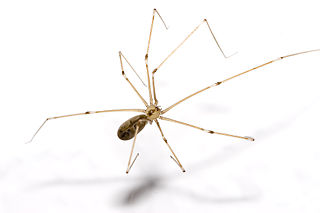
The Pholcidae are a family of araneomorph spiders. The family contains more than 1,800 individual species of pholcids, including those commonly known as cellar spider, daddy long-legs spider, carpenter spider, daddy long-legger, vibrating spider, gyrating spider, long daddy, skull spider, and angel spider. The family, first described by Carl Ludwig Koch in 1850, is divided into 94 genera.

The diving bell spider or water spider is the only species of spider known to live almost entirely under water. It is the only member of the genus Argyroneta. When out of the water, the spider ranges in colour from mid to dark brown, although the hairs on the abdomen give it a dark grey, velvet-like appearance. It is native to freshwater habitats in Europe and Asia.

Velvet spiders are a small group of spiders almost entirely limited to the Old World, with the exception of one species known from Brazil. In Europe, some are commonly called the ladybird spiders.

Synaphridae is a family of spiders with thirteen described species in three genera. It was first described as a subfamily of Anapidae, but it has since been raised to family status.

The book Svenska Spindlar or Aranei Svecici is one of the major works of the Swedish arachnologist and entomologist Carl Alexander Clerck and was first published in Stockholm in the year 1757. It was the first comprehensive book on the spiders of Sweden and one of the first regional monographs of a group of animals worldwide. The full title of the work is Svenska Spindlar uti sina hufvud-slägter indelte samt under några och sextio särskildte arter beskrefne och med illuminerade figurer uplyste – Aranei Svecici, descriptionibus et figuris æneis illustrati, ad genera subalterna redacti, speciebus ultra LX determinati, and included 162 pages of text and six colour plates. It was published in Swedish, with a Latin translation printed in a slightly smaller font below the Swedish text.

Pirata is a genus of wolf spiders, commonly known as pirate wolf spiders.
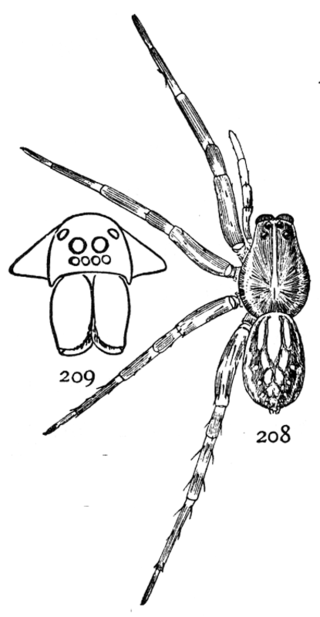
Trebacosa is a genus of wolf spiders first described by Dondale & Redner in 1981.
Pirata aspirans is a species of wolf spider in the family Lycosidae. It is found in the United States and Canada.
Pirata montanoides is a species of wolf spider in the family Lycosidae. It is found in the United States.
Pirata sedentarius is a species of wolf spider in the family Lycosidae. It is found in North America and Greater Antilles.
Pirata alachuus is a species of wolf spider in the family Lycosidae. It is found in the United States.

Alopecosa aculeata is a species of wolf spider in the family Lycosidae. It is found in North America, Europe, Turkey, Caucasus, a range from Russia, Central Asia, China, and Japan.
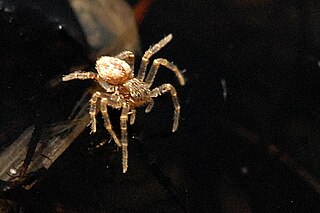
Thanatus striatus is a species of running crab spider in the family Philodromidae. It is found in North America, Europe, Turkey, a range from Russia, and Central Asia.
Diplocentria bidentata is a species of dwarf spider in the family Linyphiidae. It is found in North America, Europe, a range from Russia, and China.
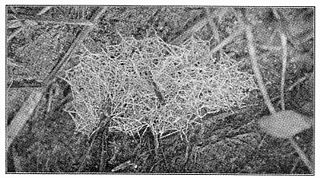
Erigone dentigera is a species of dwarf spider in the family Linyphiidae. It is found in North America, Europe, Caucasus, and Russia.

Kaestneria pullata is a species of sheetweb spider in the family Linyphiidae. It is found in North America, Europe, a range from Russia, China, Mongolia, and Japan.
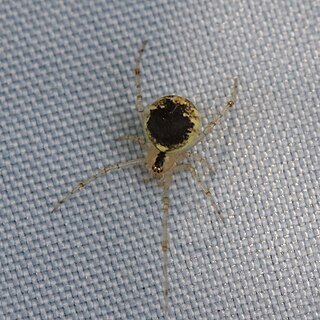
Theridion varians is a species of cobweb spider in the family Theridiidae. It is found in North America, Europe, North Africa, Turkey, Caucasus, a range from Russia, Central Asia, and China.














